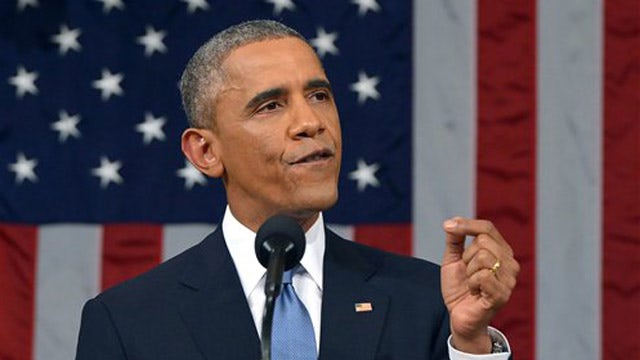Obama: We need economy to keep churning out high-wage jobs
State of the Union, Part 2: President calls for guaranteed paid sick leave, an increase in the minimum wage and free community college
The State of the Union speech is always optimistic. And it should be.
It’s a unique opportunity for the president to shape the narrative for the next year and his legacy.
President Obama's speech was out of step with the wishes of the American people and the realities we are facing at home and abroad.
To this end, President Obama’s emphasis on the economy and our “shrinking deficits, bustling industry, and booming energy production” is the obvious and clear place for him to start.
President Obama's speech was out of step with the wishes of the American people and the realities we are facing at home and abroad.
But by focusing on his agenda exclusively and not a bipartisan agenda, Obama is ignoring the will of the American people who voted Republican in November. This is especially disappointing considering that he pledged in November to work with Congress and to, above all else, be responsive to the American public’s preferences.
In his own words, “the shadow of crisis has passed and the state of the union is strong.”
Amongst the areas that we are doing well, President Obama highlighted the fact that we are creating jobs at fastest pace since 1999, that the unemployment rate lower than before the crisis, more Americans are insured than ever before and that we are not dependent on foreign oil for the first time in 30 years.
If only the American people felt that way. The speech was out of step with the wishes of the American people and the realities we are facing at home and abroad.
New Rasmussen polling numbers show that 61% of voters believe the nation is headed in the wrong direction. So even though we have seen economic growth and an unemployment rate under 6% for months now – a lower rate than before the financial crisis – yet most Americans still feel squeezed, short on money and not optimistic about the future.
And they’re afraid. The recent terrorist attacks in Paris, on the heels of the hostage situation in Australia and the slew of ISIS beheadings, have rattled Americans – and for good reason.
Over 80% of the electorate believes that there will be a terrorist attack on American soil. And, unfortunately, in light of what we now have seen is possible in Western nations, it is my belief that they may not be wrong.
In light of this, the president’s claim that we are stopping ISIS’s advance is not only wrong in real terms, but shows an administration that is out of step with American sentiment.
I am not an advocate of another ground war. And I am sympathetic to those that are concerned that if we send troops back to the Middle East, we will end up with another drawn out conflict.
But there is no doubt in my mind – and in the minds of many military officials both serving and retired – that our approach isn’t working.
I wrote last week that it was my hope that the president would be specific and focused in this speech. And that it would be specifically focused on our plan to counteract the threat from radical Islam that is very real.
Needless to say, I didn’t get my wish.
Further, there was almost no talk of policy conciliation in President Obama’s speech, despite ample opportunity for areas of compromise including immigration reform, health care reform, debt, deficit and fiscal reform as well as tax policy and infrastructure.
We heard him reassert his threat to veto any bills that come to his desk that stray from his agenda even while he also argued that “policies work as long as politics don’t get in the way.”
Veto threats are politics. Plain and simple.
And while the president may have to use his veto power – and I do understand it as a presidential right and, sometimes, an imperative – it doesn’t help to advance the state of the union, as it were.
It follows that President Obama’s plan for the next two years is to continue down the road that he has been going down for the first six years. He will focus his policies on middle class families and lowering taxes for working families; ensuring that Americans get universal childcare and paid sick leave and that women earn the same as men and that we raise the minimum wage; closing tax loopholes and raising taxes on the rich.
These are important goals and policies that by and large I agree with. But redistributionist policies are not the only solutions that are worthwhile to explore.
We need to do more and to combine both the Democratic and Republican agenda. And while President Obama ended his speech with the type of language we heard after the midterms – “we need debate without demonizing each other,” he said – it is still not clear that the president is willing to practice what he preaches.









































